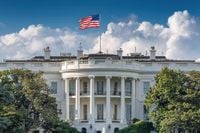In a significant shift within the Trump administration, President Donald Trump has nominated Casey Means, M.D., a health and wellness influencer, as the new surgeon general. Announced on May 7, 2025, this decision comes on the heels of the withdrawal of Janette Nesheiwat, M.D., just a day before her scheduled congressional appearance. Means, who is associated with the Make America Healthy Again (MAHA) movement, has drawn both support and backlash from various factions within the political landscape.
Means, a Stanford-trained physician, is known for her holistic health advocacy and her role as co-founder of Levels, a tech company that tracks metabolic biomarkers through continuous glucose monitors. In a post on Truth Social, Trump praised Means, stating, "Casey has impeccable ‘MAHA’ credentials, and will work closely with our wonderful Secretary of Health and Human Services, Robert F. Kennedy, Jr., to ensure a successful implementation of our Agenda in order to reverse the Chronic Disease Epidemic, and ensure Great Health, in the future, for ALL Americans.”
However, her nomination has not been without controversy. Nesheiwat’s withdrawal was partly due to scrutiny over her professional credentials, specifically claims regarding her medical training. An April 29 report from CBS News revealed that Nesheiwat, who had been a Fox News contributor, had misrepresented her degree, which actually came from the American University of the Caribbean School of Medicine, not the University of Arkansas School of Medicine as she had claimed.
Right-wing figures, including Laura Loomer, criticized Nesheiwat for her previous support of COVID-19 vaccinations, leading to calls for her nomination to be rescinded. Loomer has also voiced concerns about Means, questioning her qualifications and stating that she lacks an active medical license. "I would call her a Witch Doctor, but she doesn’t even have a valid active medical license," Loomer posted on X.
As the MAHA movement gains traction, it has become increasingly clear that there are divisions within. Some supporters of Kennedy have expressed dissatisfaction with Means, suggesting that her selection indicates his diminishing influence in the Trump administration. Mary Talley Bowden, founder of Americans for Health Freedom, remarked on X, "The new Surgeon General has never called for the COVID shots to be pulled off the market. That’s why she was picked. Kennedy is powerless.”
In response to the backlash, Kennedy defended Means, describing her as a "juggernaut against the ossified medical conventions" and attributing the criticism to entrenched interests threatened by change. He emphasized that the goal of MAHA is to reform the health industry, which he claims has contributed to the chronic disease epidemic in America.
Means has been vocal about her belief that many chronic conditions can be prevented through lifestyle changes, aligning with Kennedy's focus on nutrition and health. She has previously written about the need to reform the National Childhood Vaccine Injury Act of 1986 to allow lawsuits against vaccine manufacturers, a stance that resonates with some anti-vaccine advocates.
Despite her controversial views, Means has garnered a following, particularly among those who advocate for dietary changes and holistic health practices. Her book, "Good Energy," co-authored with her brother Calley Means, has become a bestseller in the nutrition and aging categories on Amazon. In her writings, she has made bold statements about the state of American health, claiming that the country faces a "genocidal-level health collapse" due to diet-related issues.
The nomination of Means has sparked discussions about the role of the surgeon general, traditionally seen as the public face of medicine in the United States. The position is more about education and advocacy than technical expertise. Previous surgeons general, such as Vivek Murthy, have utilized their platforms to address pressing health issues like vaccination and mental health.
Critics argue that Means' approach may veer into pseudoscience, with some of her claims raising eyebrows among public health experts. For instance, she has suggested that the barrage of vaccines given to children could be linked to rising autism rates, a claim that lacks scientific support. Such statements have led to concerns about her potential influence on public health policy.
As the MAHA movement continues to evolve, it faces internal strife over its direction and priorities. The divide appears to be between those focused on dietary reforms and those primarily concerned with vaccine skepticism. This infighting has implications for how the movement will navigate its growing political power and influence on health policy.
In light of these developments, the future of public health under Means' leadership remains uncertain. If confirmed, she could push for significant changes in how health issues are addressed in America, emphasizing lifestyle changes and nutrition over traditional medical practices. However, if her administration leans too heavily into controversial and unproven health claims, it could undermine the credibility of the surgeon general's office.
The nomination of Casey Means as surgeon general highlights the complexities of health policy in a politically charged environment. As the nation grapples with chronic health issues and the legacy of the COVID-19 pandemic, the direction taken by the new administration will undoubtedly shape the future of public health in the United States.





